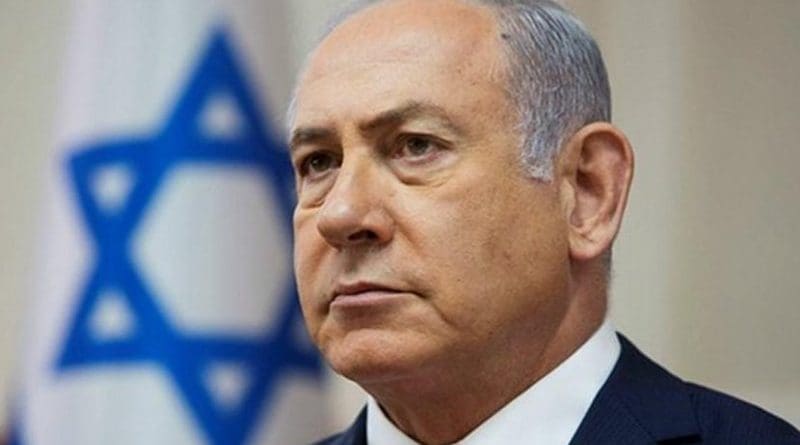Netanyahu: Israel Will Decide On Its Own How To Respond To Iranian Attack
By VOA
Israel will decide on its own how to respond to Iran’s missile and drone attacks last weekend, Prime Minister Benjamin Netanyahu said Wednesday, even as Western countries pleaded for restraint to avoid all-out Middle East warfare.
The United States, European Union and the G7 group of industrialized nations all announced plans to consider tighter sanctions on Iran, a move aimed at supporting Israel and at the same time persuading it to rein in its intention to retaliate against Tehran.
Netanyahu met with British foreign minister David Cameron and his German counterpart, Annalena Baerbock, who both traveled to Israel as part of a Western attempt to keep the Israel-Iran confrontation from escalating further, on top of the Israeli war against Hamas militants in Gaza, which is now in its seventh month.
Netanyahu’s office said he thanked Cameron and Baerbock for their support, while telling them: “I want to make it clear – we will make our own decisions, and the State of Israel will do everything necessary to defend itself.”
Earlier, Cameron said it was now apparent Israel planned to retaliate for the hundreds of missiles and drones Iran aimed at Israel, almost all of which Israel and its allies shot down. Tehran launched the Saturday attack in response to a presumed April 1 Israeli airstrike that killed military officers at Iran’s embassy in the Syrian capital, Damascus.
Baerbock said escalation “would serve no one, not Israel’s security, not the many dozens of hostages still in the hands of Hamas, not the suffering population of Gaza, not the many people in Iran who are themselves suffering under the regime, and not the third countries in the region who simply want to live in peace.”
Israel says it must retaliate to preserve its credibility.
Iranian President Ebrahim Raisi, speaking at an annual military parade on the outskirts of Tehran, warned against Israel retaliating, saying Iran would follow with a “massive and harsh response.”
The United States said it is planning to impose new sanctions targeting Iran’s missile and drone program in the coming days and expects its allies will follow suit. EU leaders are set to discuss sanctions at a summit in Brussels, and sanctions are also on the agenda at G7 talks in Italy.
Since Hamas fighters triggered the war in Gaza by attacking southern Israel on October 7, killing 1,200 people and leading to the capture of about 250 hostages, clashes have erupted between Israel and Iran-supported groups based in Lebanon, Syria, Yemen and Iraq.
Inside Gaza, Israel’s counter-offensive has killed nearly 34,000 people in Gaza, two-thirds of them women and children, Gaza health officials say, while Israel says the death toll includes thousands of Hamas fighters.
Cameron met with Israeli Foreign Minister Israel Katz, voicing support for enacting coordinated sanctions against Iran, as his counterparts from the Group of Seven leading industrial nations prepared for the talks in Italy.
“I think there’s more that we can do to show a united front, that Iran is behind so much of the malign activity in this region, backing Hamas, backing Hezbollah, backing the Houthis,” Cameron said. “They need to be given a clear, unequivocal message by the G7.”
Senior U.S. officials have said the Iranian attack on Israel, the first ever launched from Iranian soil, involved more than 110 ballistic missiles, 30 cruise missiles and more than 150 one-way, explosive aerial drones. They said Iranian proxy forces in Iraq, Syria and Yemen also took part in the attack.
Iran has called Sunday’s aerial assault a one-off event carried out in retaliation for the attack on its consulate in Damascus.
The Israeli war Cabinet, which includes Gallant, has met repeatedly in recent days to debate Israel’s response options.
Speaking to VOA’s “Flashpoint Global Crises” program in a Tuesday phone interview from northern Israel, former Israeli intelligence official Avi Melamed said Israel could retaliate against Iran with a direct military strike on Iranian territory, a cyberattack or some other kind of covert kinetic action.
Any Israeli retaliation likely would have to be coordinated with the United States, said Melamed, who runs Inside the Middle East, a U.S. nonprofit research group. He said an Israeli response also would need to make Iran pay a significant price that sends a strong message to the region while not being so painful that it triggers further Iranian escalation.
“When I look at all those components, I think it is very likely that there will be a series of covert, significant Israeli actions against Iranian assets,” Melamed said.
State Department spokesperson Matthew Miller said in a Tuesday briefing that Secretary of State Antony Blinken, in consultations with his regional counterparts, has let it be known that the U.S. does not want to see further escalation of the Iran-Israel conflict.
Israel’s Katz said in a post on the X platform that he has reached out to 32 nations to push for sanctions against Iran’s missile program and to declare Iran’s top military force, the Islamic Revolutionary Guard Corps (IRGC), a terrorist organization.
The United States is one of several countries that already designate the IRGC as a terror group. Since October, the U.S. has imposed several rounds of sanctions targeting the Iranian ballistic missile program as U.N. sanctions on that program expired.
VOA’s Michael Lipin and State Department bureau chief Nike Ching contributed to this report.

